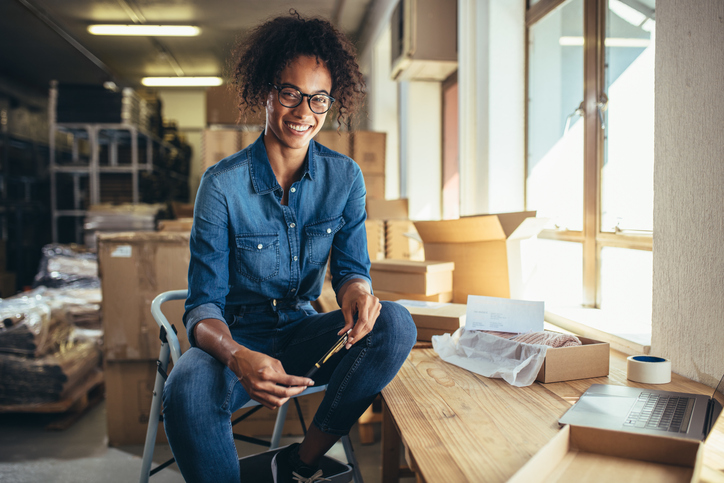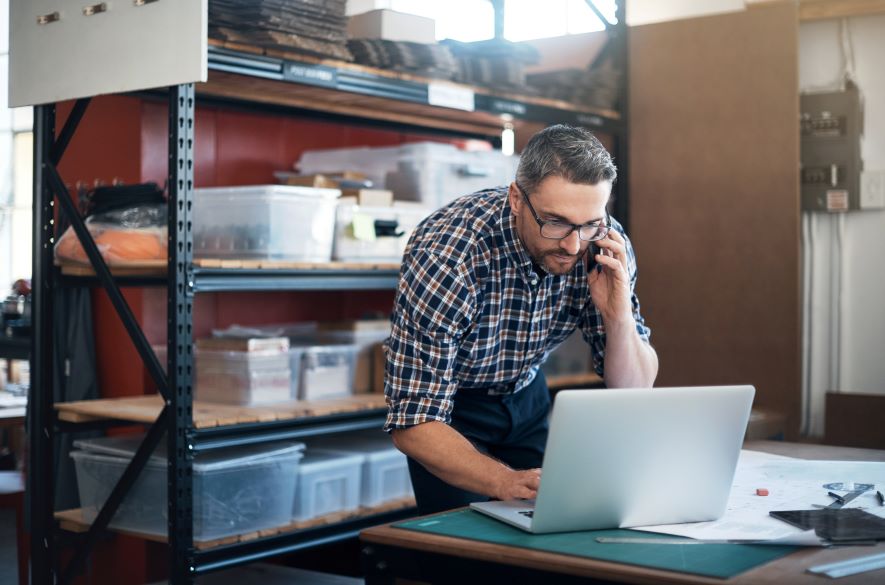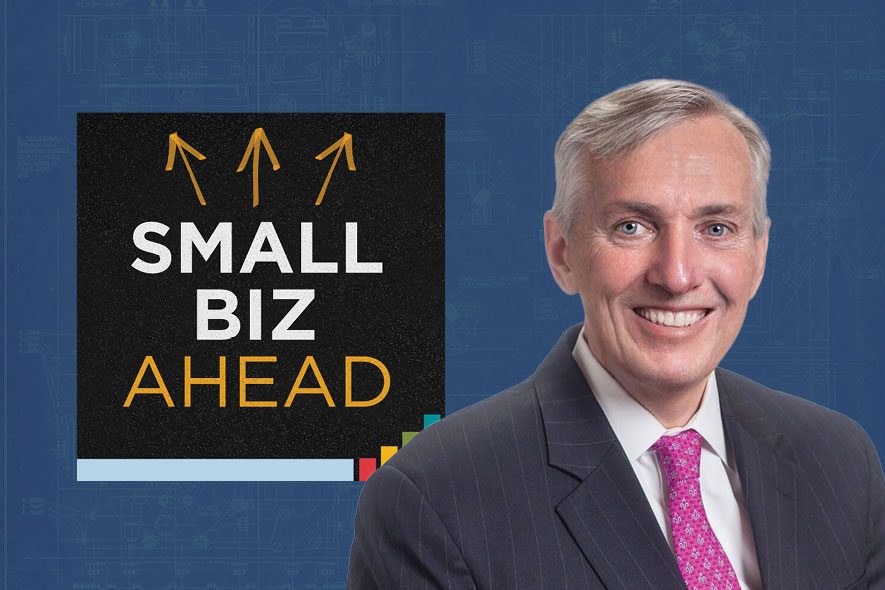When times get challenging, nothing will serve you better as a small business owner than tapping into your creativity. From operational issues to financial struggles, all it takes is a little innovation to help you find an appropriate solution. In this episode, Gene Marks along with special guest, Luciana Gomez discuss the creative strategies that not only enabled her to keep her business running, but also allowed her to retain all her current employees.
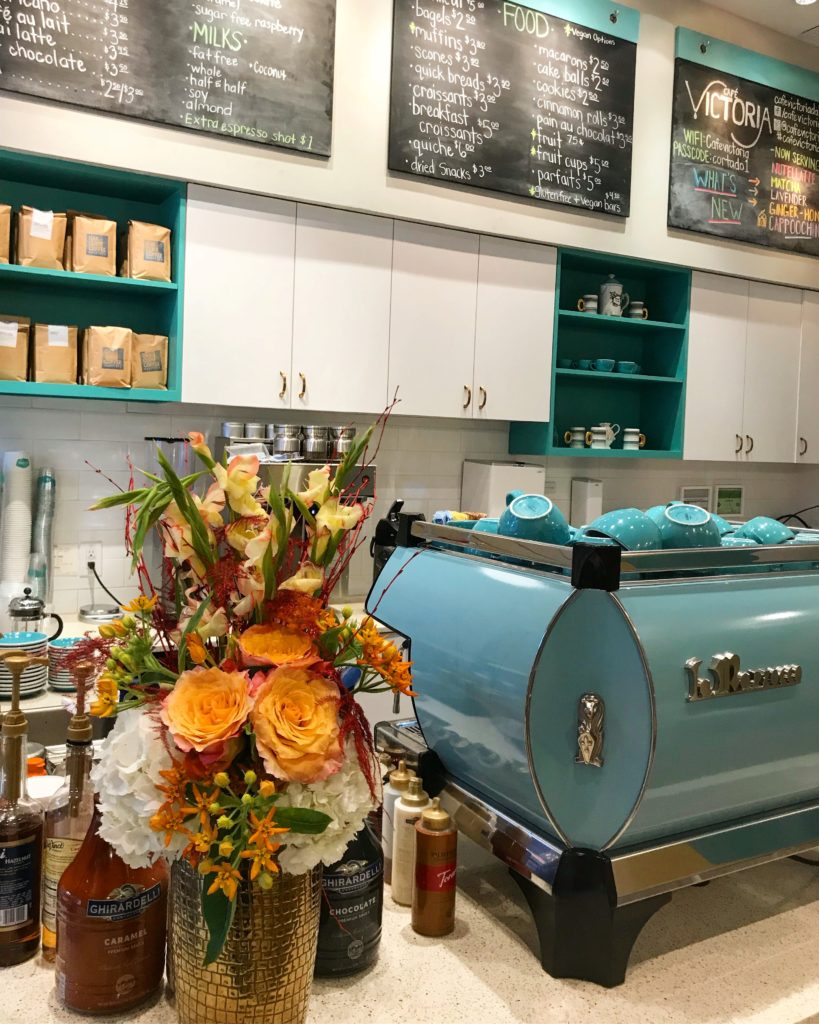
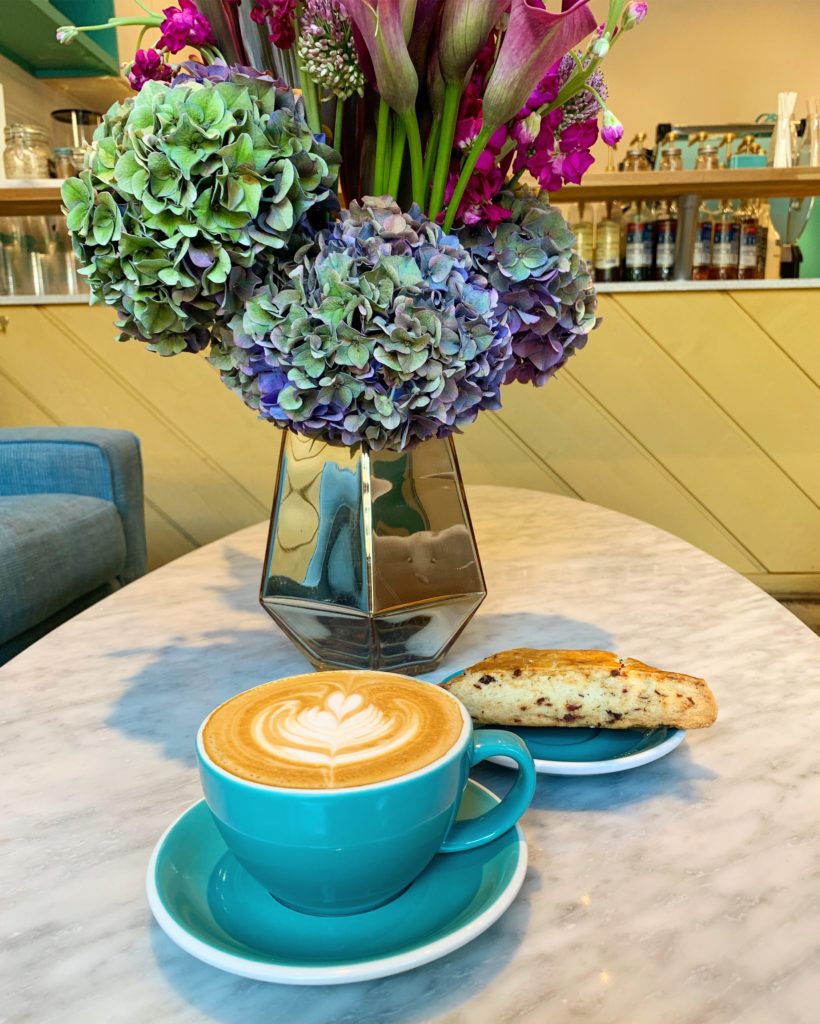
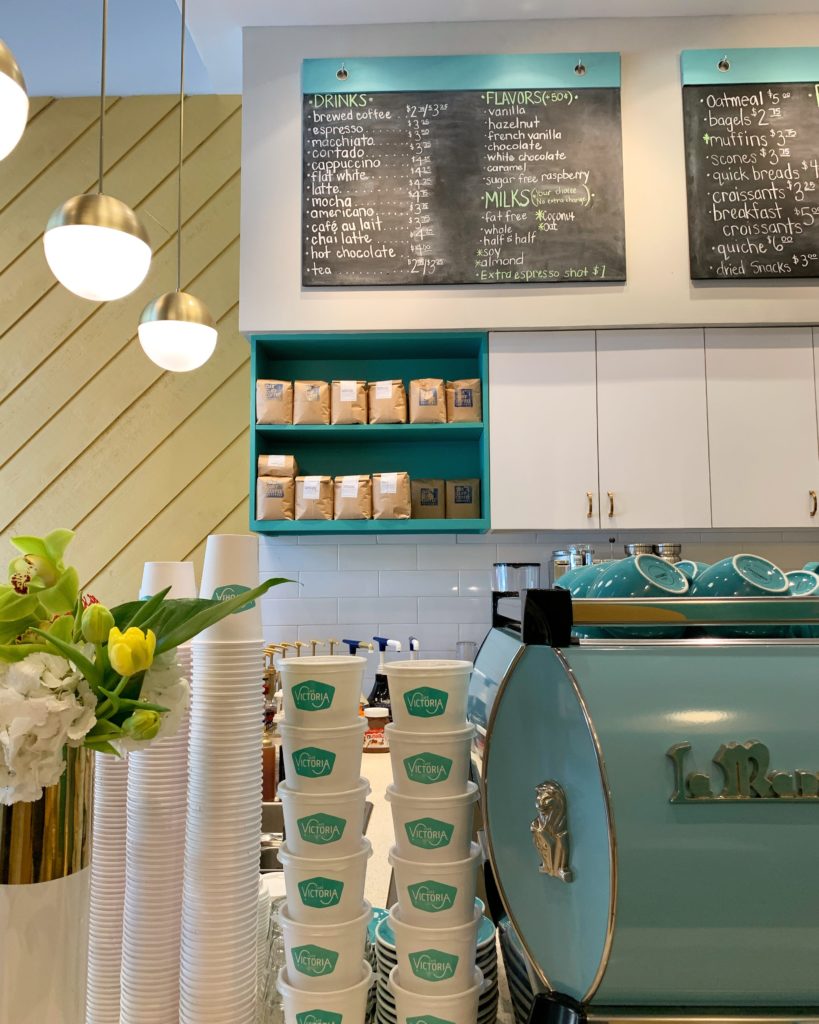
Executive Summary
0:47—Today’s Topic: How Can I Become More Creative with My Small Business during COVID-19?
2:05—One way to sustain your small business during periods of economic downturn is to have multiple streams of income.
4:51—While it is possible to keep all your current employees, you’ll have to adjust your business to accommodate both your finances and the new safety guidelines. These adjustments might include reducing your usual business hours, decreasing the number of onsite staff members during each shift, and assigning more employees to take care of the deliveries or other offsite work.
7:52—Cash reserves and PPP (Paycheck Protection Program) loans can help shoulder some of the financial strain your business might be experiencing.
9:17—Because safety is your primary concern right now, you must continue to enforce social distancing policies. It’s better to have less traffic in your business than to risk the health of your staff and customers.
11:02—Apart from PPP loans, you should also consider applying for an Economic Injury Disaster Loan.
13:03—If you belong to a marginalized group, be sure to research grants, loans and financing options that are reserved specifically for minority business owners.
15:30—Rather than panicking, business owners should use this current crisis to fuel their creativity and develop more innovative ways to run their operations.
Links
Transcript
Gene: Hey everybody and welcome back to the Small Biz Ahead podcast. My name is Gene Marks from The Marks Group and I’m glad that you have joined us. And also joining us today is Luciana Gomez, who is the owner and founder of Cafe Victoria in Dallas. Her website is cafevictoriadallas.com, and I will give that at the end of this segment as well. But Luciana, welcome. Can you give me an awkward hello?
Luciana: Hi, Gene. Awkward. Is this awkward enough?
Gene: Yeah, that’s awkward enough.
Luciana: Or I do have an accent, so let’s just say-
Gene: Oh, no, that’s plenty awkward.
Luciana: Everything I say will be awkward.
Gene: No, that’s great. I appreciate that. I’m glad you’re joining me today, Cafe Victoria, this is a coffee shop?
Luciana: It is. It is a neighborhood coffee shop. We’re a small shop in the heart of Victory Park, which is a small neighborhood next to downtown Dallas.
Gene: How long have you been running it?
Luciana: About four and a half years, so it’s been a while.
Gene: Wow. And what did you do in a prior life before starting it?
Luciana: Corporate world. My background is in advertising, so I worked in advertising agencies for about almost 20 years until I had this crazy idea of opening my own consulting company. I’m a marketing consultant and also this crazy idea of opening my own coffee shop, which I have to be honest, it was much simpler when I had this idea and then it’s just been an amazing ride. Owning my own business is something that’s very different from what I was used to and I’m just loving it.
Gene: It is kind of crazy, quitting a corporate job and then opening up your own business. And this is important, so you’ve got the coffee shop and do you still do marketing consulting? So in other words, do you still have two streams of income coming in?
Luciana: I do. I do. Yes.
Gene: Good.
Luciana: And as you said, it was much simpler when I wasn’t self-employed, I had my corporate job, but owning my own business has been amazing and it’s just a different way of living. You’re basically on all the time, you’re 24 hours a day, and it’s just very, very intense, but at the same time, you have some tone on what you’re doing and I’m just loving it. And I do have the diversity of having my coffee shop, which is much different business that my consulting business.
Gene:
I always wonder if there’s an individual coffee shop that you have you, is that enough to sustain a living? And when I do speak to people that own coffee shops, unless they have multiple locations where they have some scale, a lot of them have other sources of income. They do other consulting, like yourself. Some people have spouses, or family money, or whatever. Is that the case? If you didn’t do marketing consulting, do you think that you could earn a living entirely from Cafe Victoria, or do you think that you would need still another stream of income?
Luciana: No. The short answer is no. It’s very hard. A business like a coffee shop, it can be like you said, it’s better when you have multiple locations and you can kind of play with it a little bit. One can performer better than another. For me, I pay close attention to quality and the type of items we serve, the type of coffee we serve. And I don’t really take the cheap route on anything really. I do everything in the highest quality I can. So my margins are not there. And of course when you run your own business, you always have to be prepared for any challenges that come your way, and this year has been the perfect example of that. So if I didn’t have my consulting, it will be impossible for me to make a living. So I like having the two things because it keeps me busy and it keeps me on my toes all the time because they are two different businesses. So it would be very difficult.
Gene: So you mentioned that this year has been challenging? I don’t understand. What you mean by that?
Luciana: I don’t know. Am I being too negative?
Gene: The pandemic hits. Tell me how that affected you and your business. And I have to tell you, I’m actually not even sure. I live in Philadelphia, so our whole area was pretty much shut and locked down. Was that the case in Dallas? Just tell us what happened when the pandemic really hit.
Luciana: Yeah. It was the same case here and expected for everybody, of course. And I’m not going to say anything that people haven’t experienced themselves. For us in our business, we managed to stay open. My first reaction of course was safety and making sure that also my team was safe in terms of their employment and making sure that I was able to keep them, which I was. And that has been my biggest accomplishment in this pandemic and I’m very proud of having been able to do that. And to your point before, it was because I do have two different business and I’ll manage to kind of support one with the other, but we had to move very fast, adjust and just like everybody else. In our case, what I did particularly is reduce some hours because of people were not out a lot.
We depend a lot on the traffic of the American Airlines Center, which is where the Mavericks play and the Stars here in Dallas. And also we have a lot of events. Offices were closed, so all that afternoon traffic, we lost. So we reduced our hours. And then what I also did is incorporate a delivery service, which is something I have been thinking of doing since I opened four years ago. And really we got it done in four days, which really is a good testament of how crisis are all kind of opportunities to be creative and just to move forward and do things that sometimes we don’t dare do in normal time. So I did that. And then on May 1st, we were able to go back, open at regular hours, and added 25% capacity. Right now it’s at 75%, per data sets or so.
So people have been great in terms of safety. We have, of course, all the standard measures. And being a food establishment, we already have a lot of cleaning standards in place that in normal times we take care of anyway, but now of course we ramped those and the use of masks, and hand sanitizer, and just constantly cleaning surfaces and things like that have then allowed us to provide a safe place for our customers and also for our employees. So in terms of sales, we are still down significantly, but as I said, I’m happy that I was able to stay open like a lot of people, and I’m happy that my thing is in tact.
Our Sponsor
This podcast is brought to you by The Hartford. When the unexpected strikes, The Hartford strikes back for over 1 million small business customers with property, liability, and workers compensation insurance. Check out The Hartford’s small business insurance at TheHartford.com.
Gene: It is a ride and I’ve heard similar stories from so many other business owners around the country. And when you shut down, you had expenses. Again, you have the marketing consulting side, so I’m assuming that probably continued on. How did you pay your bills during the period when things were shut down?
Luciana: Well, I was lucky to have savings. That’s what I did and that’s what I used. It probably would have been easier for me to shut down and wait, but I want to do to keep going. So I did that and then I was lucky to get a PPP loan, which is helping, but that’s almost gone because it’s been almost two months. So that helps a lot, but that’s really it. So I think the big question is what’s going to happen after the money is gone? We’ll work until that and what’s sort happen afterwards? Hopefully we will see an increase in sales and we’ll be able to go back to a situation where I can pay the bills.
Gene: You say hopefully, but certainly there’s no guarantee of that. I’m going to step back a little bit, because I do want to talk about the feature, but a couple of other things you mentioned. In the Dallas area, you guys reopened ahead of a lot of other areas. One of the things you had to maintain 25% capacity. Now you’re up to 75% capacity. What does that mean and how do you measure that? Are you literally, if one customer comes in the throws you into 76.9% capacity, you physically throw them out of your shop? How do you handle that?
Luciana: Yes. That’s a good question. It’s very, very hard to manage. For us, we’re a small shop. You have the two extremes of people. People here in Dallas, as I’m sure around the country and around the world, which is you have the people that are extra careful and the people that don’t care and just go out. For us, we’ve had a mix of both. Right? So a lot of people, a lot of our customers are very thoughtful and they’re waiting outside as they see people inside. At the beginning, we had notices and a note on the door and we would tell customers. Our store is very, very small, so 25% capacity really meant four people including our barista. Right? So we had one barista at a time, so we would have to manage that, but we would tell them to wait outside.
And then in terms of the seating, we have an outdoor seating. And I think people prefer that. And we just manage and make sure that we don’t exceed that amount. We have not been in a situation where we have a kid or we had uncomfortable discussions with customers where we have to kick them out. It wasn’t like that at all. It hasn’t been like that. We’re very responsible with the way we do things. I don’t see that across the board. And I see other places that are not necessarily like that, but we take safety and healthy measures very, very seriously because we understand what the consequences of somebody getting sick or being exposed in our shop are, and I really don’t want that to happen. And we know there’s a reason we have an increase in cases and all that, so we have to be very careful.
Gene: You mentioned before about cash flow, you mentioned about the paycheck protection loan, which was helpful to you, but you’re right, time is kind of running out on that. Why not apply for aid elsewhere? Have you looked into the economic injury disaster loans, for example, or any aid from your state?
Luciana: Yeah. That was the first one I applied to. I do have to tell you that I got an email from them, but it said click here and I’m very reluctant to do that. So I have to call them and see because apparently they’re missing some information from me. So I did follow that application. I don’t know if it’s going to make a huge difference because I think it’s $1,000 for employee or something like that and I have a small staff, but that, that I will do. I do have to call them and hopefully I will get that. And other routes, I applied to a lot of different funds from organizations, but I did not get any of that. So I applied to one, I think Facebook had one and there was another one from The Red Backpack fund, which is from the person that founded… I don’t remember her name, but somebody sent it to me and I applied to that. And then I applied to the City of Dallas had another one, but I didn’t get that one either. So, I tried.
Gene: I have to say, from an advice standpoint, first of all, the economic injury disaster one, you do get an advance of $1,000 per employee, but the loan itself, it can be much more. You can get up to a $150,000 loan. If you were to get, say a $75,000 loan, this is a 30 year payback with a fixed interest rate of 3.75%. So if you were to get a $75,000 loan through that program, your monthly payment would be about 350 bucks. So I just want to encourage you. And the SBA has been awful with it. They’ve been behind, they’ve been uncommunicative, it’s a whole thing as you know, but there is still plenty of money available in that fund. And just from me to you, I would say you might want to double down your efforts there because it could really see you through. And at the end of the day, I’m just kind of curious. You’re a Latino business owner, you’re a female business owner, have you dug into any type of grants, loans, financings for minority owned businesses? It seems like there would be opportunities out there for you.
Luciana: Yes. I looked into the couple that I mentioned. Unfortunately, I don’t remember the name exactly what that organization was. A friend of mine sent it to me, but I have to dig deeper into that. I’m trying to stay away from loans. What you’re saying about the low interest, what I liked about the PPP is that it becomes a grant if you use it properly, and the loans, I really don’t know. I have to look into that, but I know I have an advantage with that and I definitely have to pursue that. I’m remaining hopeful in the sense that I have seen a little bit of spike in the last few days that hasn’t gotten to where we used to be, but at least it has gotten a little bit more traffic. And I’m hoping that will remain so I can sustain the business without having to apply to any more loans, but I’ll definitely look into that.
Gene: Well first of all, I agree with your point of view about getting loans. And as a business owner myself, I’ve never had debt. So I’m not thrilled about engaging loans, although the EIDL, the economic injury disaster loan, it’s pretty cheap money. And again, I’m only saying this to you, the minority programs, there are a lot of grants available as well. Not necessarily loans, and they’re all over the country. A lot of corporations are doing it. There’s a really good resource on The Hartford’s websites, smallbizahead.com, that lists all of that, and we’ll put that in the show notes because I think it’s something that you want to spend time doing. Okay. In just the last couple of minutes that I have here with you, we’re looking ahead.
So I personally, I’ve talked to different people, Luciana, that like me… Well, not like me, are pessimistic about the future. I’m more optimistic and I’ll be on record as saying I do think that there will be a good recovery and I think there will be vaccines sooner than we think and lots of treatments. And that’s just me based on whatever the data is that’s out there, and you can argue or not, but let’s take the worst case scenario because you and I are running businesses. Okay. So what if there is a second wave? What if your revenues continue to stay down through the rest of this year? Are you prepared for that and what are you doing with your business now to stay in business?
Luciana: First, I will tell you, I’m from Argentina originally. Being from Latin America, I’m used to crisis and I’m used to dealing with them. I’m kind of with you on the optimism, but I also don’t fear a recession, or second wave, or things of that nature just because personally, and maybe I’m being too optimistic here, but I personally think that every time there’s a crisis, there is an opportunity I might see. And first of all, the amount of support that I’ve received from everybody, personally from my friends and even I have a group of friends that got together and gave me a donation to help with my business, which was heartwarming, and unexpected, and amazing. And to customers that have bought just ridiculous amount of gift cards just so they could support my business and keep us going because we provide coffee for them and they love us.
And that, for me, is just unbelievable. So in these types of crises when these things resurface, and I love that. At the same time, I do think that creativity comes in this times of crisis. And I will remain creative in terms of how I see my business and what I can do to keep it running. And for me, it is almost like a challenge that I will take on it and do now. Maybe I feel optimistic also because I was able to keep my team and I was able to keep my business running, which is not the case for everybody. So I’m very conscious of that. But at the same time, I do feel that as a small business, we always see ourselves as we’re less than other people or we’re less than other companies, but the reality is we’re much more nimble and we can move faster.
I see that as an opportunity every time something like that happens. So this year has been the year of challenges for everybody from multiple issues that we’ve had throughout the year. And for me, it has kept me on my toes and thinking of how I can move forward. So I know that I’ll be able to do it. I’m very confident that no matter what comes our way, we’ll be able to survive. Even if we have to reshape our business or how we do it, we’ll make it happen. Again, I want to be overly optimistic, but at the same time, I do feel that that crisis presents this opportunity to rethink those things that sometimes we’re too comfortable to think about.
Gene: I love talking to people who have been through crisis, like yourself. This has been great. I appreciate the conversation. One final question. I’m looking over your menu right now. Who is ordering a raspberry latte? It sounds absolutely disgusting.
Luciana: Lots of people.
Gene: Really?
Luciana: Yes. And look, I’ll be honest, I also want you to see I’m half Italian, half Spaniard. Right? So if it was my choice, I would only serve espresso coffee. I will have a bar with espresso. But we have a ridiculous amount of syrups of different flavors and people love them. And I have tried them myself, and I’ll tell you they’re really good. Not to be funny with it. Not my type of syrup, not my type of coffee necessarily because I do drink espresso, but a lot of people do like them and particularly iced coffee now that it’s so hot here in Dallas. So we have an amazing amount of different flavors. So it’s been a learning experience for me as well. That said, it’s also that you also have to cater for your customers and not have a shop that’s working only for you. Because otherwise for me, it will be the most boring coffee shop ever.
Gene: I’m the same way. It just amazes me the things that people have in their coffee, but hey, freedom of choice. So, fair enough.
Luciana: Exactly. Exactly.
Gene: Luciana Gomez is the founder of Cafe Victoria in Dallas. Her website is cafevictoriadallas.com, C-A-F-E-V-I-C-T-O-R-I-A dallas.com. Luciana, thank you so much. Great information. And I’m glad to see that you’re like me and optimistic for the future. And listen, maybe you and I will be in the poor house in a year and we’ll commiserate with each other then sipping a few raspberry lattes. Let’s hope not. Okay?
Luciana: Thank you, Gene. Thank you. I appreciate it.
Gene: Thanks everyone. Thanks everyone for joining us for another edition of the Small Biz Ahead podcast. For the latest on small business trends, visit The Hartford’s Small Business Ahead blog. We’ve got articles, how to’s, and videos to help you on your business, run your business more efficiently. Check us out at smallbizahead.com. Again, Luciana, thank you so much. And hopefully you and I will stay in touch. We’ll bring you back next year.
Luciana: I hope so.
Gene: Take care. Bye now.
Download Our Free eBooks
- Ultimate Guide to Business Credit Cards: The Small Business Owner’s Handbook
- How to Keep Customers Coming Back for More—Customer Retention Strategies
- How to Safeguard Your Small Business From Data Breaches
- 21 Days to Be a More Productive Small Business Owner
- Opportunity Knocks: How to Find—and Pursue—a Business Idea That’s Right for You
- 99 New Small Business Ideas

